Connellsville A Family History
The Robbins
Not sure how, but this appears to be the family that
Patience Robbins Bishop, Nana’s great great grandmother is related to.
Richard Robbins (immigrant ancestor, circa 1630)
└─ Samuel Robbins (CT/Westerly settlers)
└─ Brintnel Robbins (1756–1836) ─ moved to Connellsville area
└─ William Robbins (1795–1834)
└─ Joseph Robbins (1824– ) ─ pioneer coal operator
└─ Edward Everett Robbins (1860/61–1919) ─ influential in coal, politics, banking
Robbins Family — Connellsville Region
The Robbins family played a formative role in the early industrial and civic development of the Connellsville area and the greater Youghiogheny River Valley in southwestern Pennsylvania. The earliest documented ancestor in the region was Brintnel Robbins (1756–1836), born in Connecticut and a veteran of the Revolutionary War.¹ After the war, he migrated to western Pennsylvania and is known to have spent his first winter in Connellsville, working ore at the Turnbull Furnace, a pre-industrial ironworks located nearby.
Robbins acquired land along the Youghiogheny River, which later became known as Robbins Station, and engaged in farming, milling, and ore transport.¹ Though not involved in the official founding of Connellsville (established by Zachariah Connell in 1793), Brintnel and his descendants helped shape the early economic structure of the area through land development and mineral extraction.²
His son, William Robbins (1795–1834), continued to develop the family’s holdings in the region. William’s son, Joseph Robbins (born 1824), was one of the first individuals to open coal operations in the Youghiogheny Valley, launching the Osceola Mine in 1848. Joseph was also an early promoter of river canalization efforts, seeking to increase river-based transportation of coal and coke during a period when railroad interests were expanding.³
The most prominent figure in the Robbins lineage was Edward Everett Robbins (1860 or 1861 – 1919), Joseph’s son, who was born at Robbins Station and later became a lawyer, soldier, businessman, and politician.⁴ After being admitted to the bar, he engaged in both legal practice and industrial development. He served as president of the Connellsville Basin Coke Company, as well as other banking and coal enterprises in Fayette and Westmoreland counties.² Robbins also served as a Pennsylvania State Senator, and later as a member of the U.S. House of Representatives from 1905 to 1907, representing Pennsylvania’s 21st Congressional District.⁴
In addition to his civilian roles, Robbins was commissioned as a major during the Spanish–American War, a fact confirmed in government military service records and Pennsylvania veterans’ registries.⁵ His dual leadership in industrial expansion and public service symbolized the tight interweaving of extractive enterprise and politics in the coal regions of turn-of-the-century Pennsylvania.
The Robbins name remains associated with the geography of the area through Robbins Station, a known location in early Fayette County maps and coal distribution routes. Their activities are well documented in biographical archives and genealogical records, including public domain histories and U.S. government directories.
Footnotes and Sources
Edward Everett Robbins
• Wikipedia Entry [Wikipedia]
• Biographical and historical cyclopedia of Westmoreland county, Pennsylvania [Internet Archive]
• New York Times Obit [New York Times]
• MEMORIAL ADDRESSES DELIVERED IN THE HOUSE OF REPRESENTATIVES OF THE UNITED STATES
U.S. SIXTY-FIFTH CONGRESS, THIRD SESSION [Internet Archive]
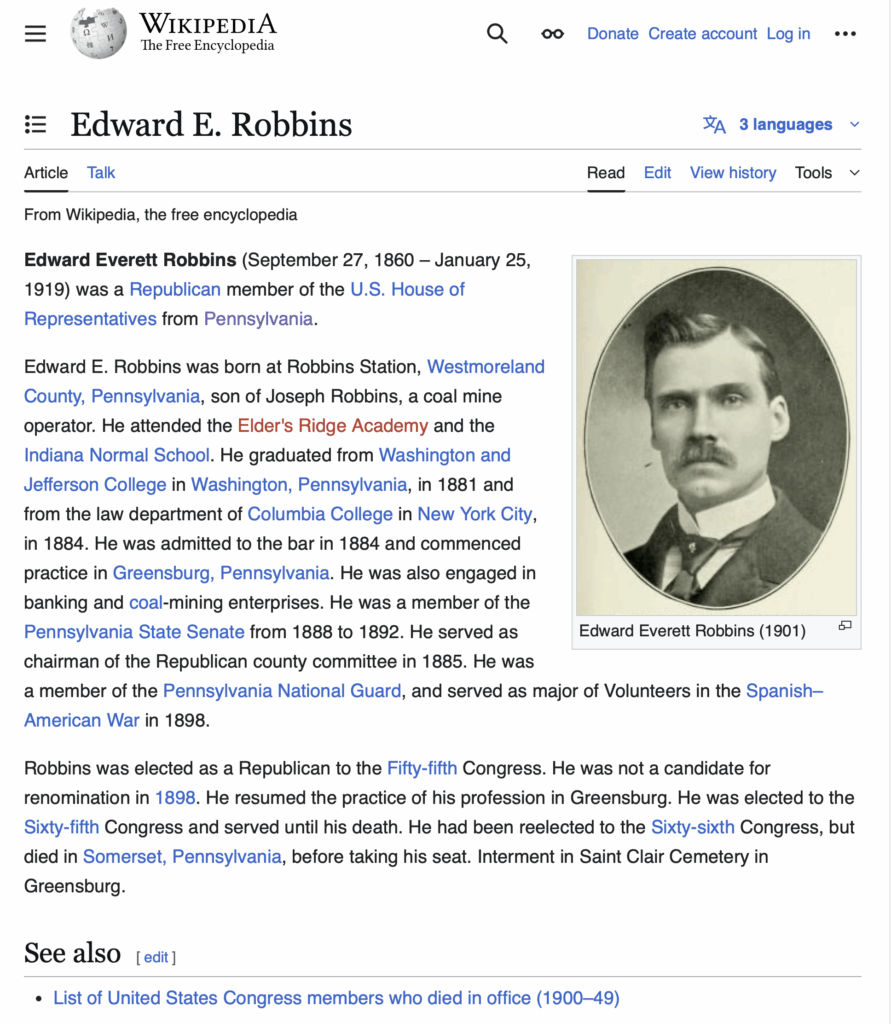
Edward Everett Robbins (September 27, 1860 – January 25, 1919) was a Republican member of the U.S. House of Representatives from Pennsylvania.
Edward E. Robbins was born at Robbins Station, Westmoreland County, Pennsylvania, son of Joseph Robbins, a coal mine operator. He attended the Elder’s Ridge Academy and the Indiana Normal School. He graduated from Washington and Jefferson College in Washington, Pennsylvania, in 1881 and from the law department of Columbia College in New York City, in 1884. He was admitted to the bar in 1884 and commenced practice in Greensburg, Pennsylvania. He was also engaged in banking and coal-mining enterprises. He was a member of the Pennsylvania State Senate from 1888 to 1892. He served as chairman of the Republican county committee in 1885. He was a member of the Pennsylvania National Guard, and served as major of Volunteers in the Spanish–American War in 1898.
Robbins was elected as a Republican to the Fifty-fifth Congress. He was not a candidate for renomination in 1898. He resumed the practice of his profession in Greensburg. He was elected to the Sixty-fifth Congress and served until his death. He had been reelected to the Sixty-sixth Congress, but died in Somerset, Pennsylvania, before taking his seat. Interment in Saint Clair Cemetery in Greensburg.

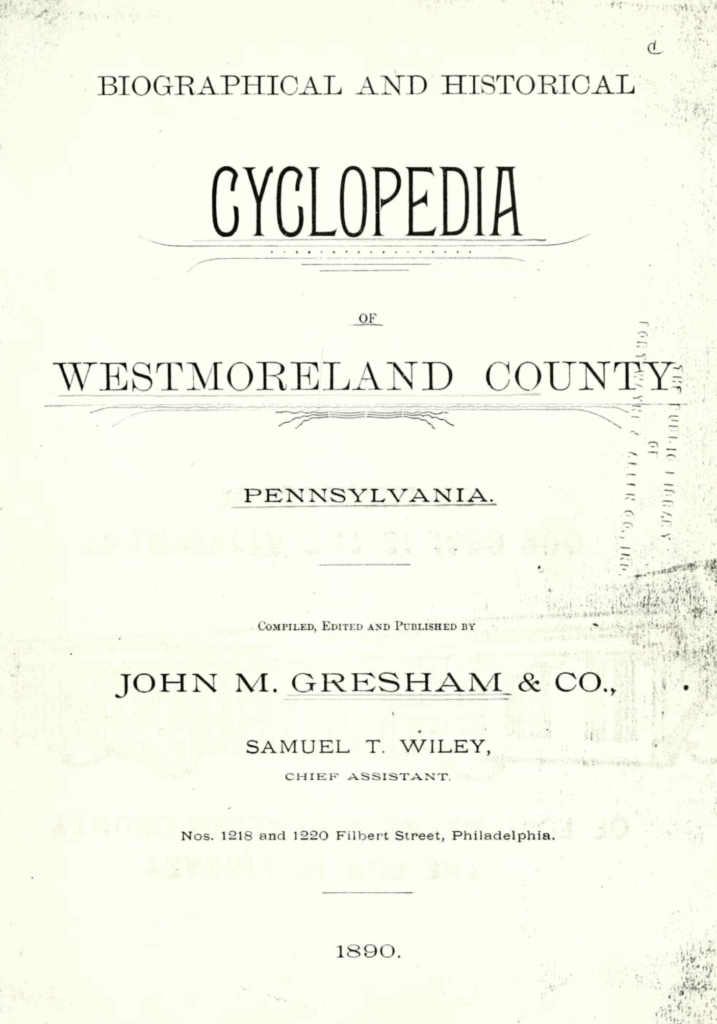
Biographical and historical cyclopedia of Westmoreland county, Pennsylvania
Publication date 1890
Topics genealogy
Publisher Philadelphia [Dunlap & Clarke]
Collection allen_county; americana
Contributor Allen County Public Library Genealogy Center
Page 766 – 768 (of 1,418)
Internet Archive: https://archive.org/details/biographicalhist00gres/page/n765/mode/2up
EDWARD EVERETT ROBBINS, one of the young and popular Republicans of Pennsylvania and a prominent and well-known lawyer of Westmoreland County, is a son of Joseph and Rachel G. Robbins, and was born in North Huntingdon Township, Westmoreland County, Pa., September 27, 1862.
The Robbins family of Westmoreland County is a branch of one of the numerous Robbins families of New England, who are all descended from a Robbins who (it is stated) with his wife and children came over from England in the next ship after the Mayflower, which anchored along the then wild and bleak New England shore. Half a century later, his descendants nearly all perished in King Philip’s War in 1675.
Savage makes record in Connecticut of a John Robbins of Wethersfield in 1638, a Richard Robbins of Cambridgein 1640, and a Benjamin Robbins of Wallingford in 1677. From these Connecticut Robbins families came many distinguished men of New England—eminent divines, classical scholars, judges of the courts, members of the legislature, governors, and United States senators.
Of the latter was Hon. Asher Robbins, an eminent lawyer who, between 1825 and 1829, was one of the U.S. Senators from Rhode Island. He was an impressive speaker, a classical scholar, and an able statesman.
Among several of the Robbins who were officers in the Revolutionary War was Lieut. Brintnel Robbins (great-grandfather), who was a brave and distinguished officer and fought under Washington’s immediate command. After peace was declared, he engaged in running a trading vessel between Connecticut and the West Indies, but suffered a severe loss and migrated west in 1792 to retrieve his broken fortunes.
He stopped for a time at Connellsville, Pa., worked at Old Alliance Furnace on Jacob’s Creek, and on its owners’ failure received his pay in castings, which he traded for a farm at Port Royal.
After owning two or more farms and running a grist mill, he purchased in 1795 the “Crawford Sleeping Place” of 290 acres, and 410 acres of additional land. On this farm he erected a house, saw and grist mill, and a distillery.
In 1803 or 1804, he moved to Pittsburgh, soon bought a farm of 100 acres at the mouth of Plum Creek, and built two vessels in 1812 for the lower trade—one of which was lost and the other he sold. By request of the government, he built the boats which conveyed Scott’s troops across the Niagara River into Canada.
He moved to Greensburg about 1824, kept a hotel, and afterward removed to the Wegley farm near the county home. He died July 25, 1836, aged 80 years and 4 months, and was buried in Harrold Graveyard near Greensburg.
Lieut. Brintnel Robbins was widely known and highly respected as one of the prominent business men of his day. He married Mary Boardman, of Danish descent, and his children were: Archibald, Hezekiah, Moses, Joseph, David, William, Mary, Keziah, Rachel, and Elizabeth.
Moses Robbins was born in February 1790, and died March 10, 1870. He was one of the first shippers of coal by flatboat to Cincinnati and St. Louis. His children were: Mary J., Loren, Rachel G., and James W.
William N. Robbins married Agnes Sloan, who was of Irish descent. He died young in 1834 of cholera. His children were: Joseph, Mary, Morrison, Hezekiah, Elizabeth, Gilmore.
William and Keziah. Joseph, oldest son (father), was born April 1, 1824, and married Rachel G. Robbins, who was a daughter of Moses Robbins, and died in 1861, leaving two children: Hon. Edward E. and Archibald.
In 1868, Mr. Robbins married Margaret Ghistry, and by this second marriage had five children living: Elizabeth, Rachel, Agnes M., Morrison, and Joseph Jr.
Joseph Robbins was engaged for many years in mining and shipping coal to Cincinnati and New Orleans. Of late years, he has resided on the farm at Robbins Station and is engaged in farming, besides being still largely interested in the coal trade and other business enterprises.
Edward Everett Robbins attended the common schools, pursued academic studies, and prepared for college at Elder’s Ridge Academy and the Normal School of Indiana, Pa.
On September 7, 1877, he entered the freshman class of Washington and Jefferson College and was one of the first ten of his class of forty-five members to graduate from that institution on June 26, 1881.
He was president of his college class and delivered an oration at commencement on the Irish Land Question.
In January 1882, he entered the office of John F. Wentling of Greensburg as a student of law, and after completing the full course at Columbia Law School, New York City, was admitted to the Westmoreland County Bar on April 8, 1884.
In 1884, he became assistant secretary of the Republican County Committee, and the next year, as chairman, he conducted the campaign with such political sagacity and success that Westmoreland County, for the first time, gave a majority for the Republican state ticket and recorded 401 votes more for Col. Quay than for his opponent for state treasurer.
In 1886, Mr. Robbins was nominated by a [missing number] majority for district attorney, but was defeated.
In 1888, he was given the Republican nomination for the state senate, and after a long and closely contested campaign was elected to represent the Thirty-ninth Senatorial District of Pennsylvania, composed of Westmoreland County, for a term of four years.
At the time of his election and induction into the senate, he was the youngest but one of the members of that honorable body.
As a legislator, Senator Robbins has never been remiss in duty and has served his constituents so faithfully as to win the respect of his political opponents and increase his popularity within his own party.
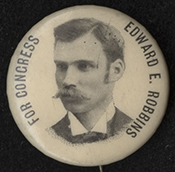
https://history.house.gov/People/Listing/R/ROBBINS,-Edward-Everett-(R000298)/#concisebio
ROBBINS, Edward Everett, a Representative from Pennsylvania; born at Robbins Station, Westmoreland County, Pa., September 27, 1860; attended the public schools, Indiana (Pa.) Normal School, and Eldersridge (Pa.) Academy; was graduated from Washington and Jefferson College, Washington, Pa., in 1881 and from the law department of Columbia College, New York City, in 1884; was admitted to the bar in 1884 and commenced practice in Greensburg, Pa.; also engaged in banking and coal-mining enterprises; member of the State senate 1888-1892; chairman of the Republican county committee in 1885; member of the Pennsylvania National Guard; served as major of Volunteers in the Spanish-American War in 1898; elected as a Republican to the Fifty-fifth Congress (March 4, 1897-March 3, 1899); was not a candidate for renomination in 1898; resumed the practice of his profession in Greensburg, Pa.; elected to the Sixty-fifth Congress and served from March 4, 1917, until his death; had been reelected to the Sixty-sixth Congress; died in Somerset, Somerset County, Pa., January 25, 1919; interment in St. Clair Cemetery, Greensburg, Pa.

New York Time obituary
January 26, 1919, Page 20
SOMERSET, Penn., Jan. 25.—Congressman Edward Robbins of Greensburg, Penn., died at a hotel here at noon today, following a few days’ illness of influenza. Mr. Robbins came here to make an address and was stricken.
Mr. Robbins was born at Greensburg Sept. 27, 1861, and after receiving the A. B. degree at Washington and Jefferson College in 1881, he studied law at Columbia University, being admitted to the Pennsylvania bar in 1886. In addition to his law practice at Greensburg he was interested in coal and banking business. A member of the State Senate from 1888 to 1894, he was elected to Congress from the Twenty-second District in 1897, resigning in 1898 to fight in the Spanish-American War. He was re-elected two years ago, representing Westmoreland and Butler Counties.
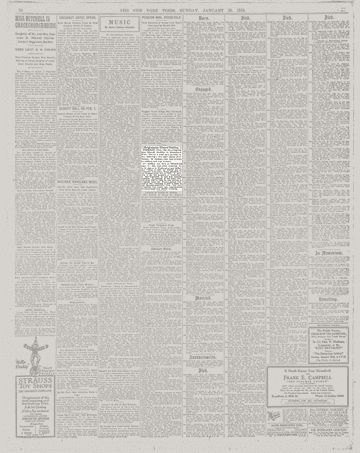
MEMORIAL ADDRESSES DELIVERED IN THE HOUSE OF REPRESENTATIVES OF THE UNITED STATES
U.S. SIXTY-FIFTH CONGRESS, THIRD SESSION, 1918 – 19194, Proceedings in the House, February 16, 1919 Proceedings in the Senate, January 27, 1919 [Internet Archive]
EDWARD EVERETT ROBBINS
(Late a Representative from Pennsylvania)
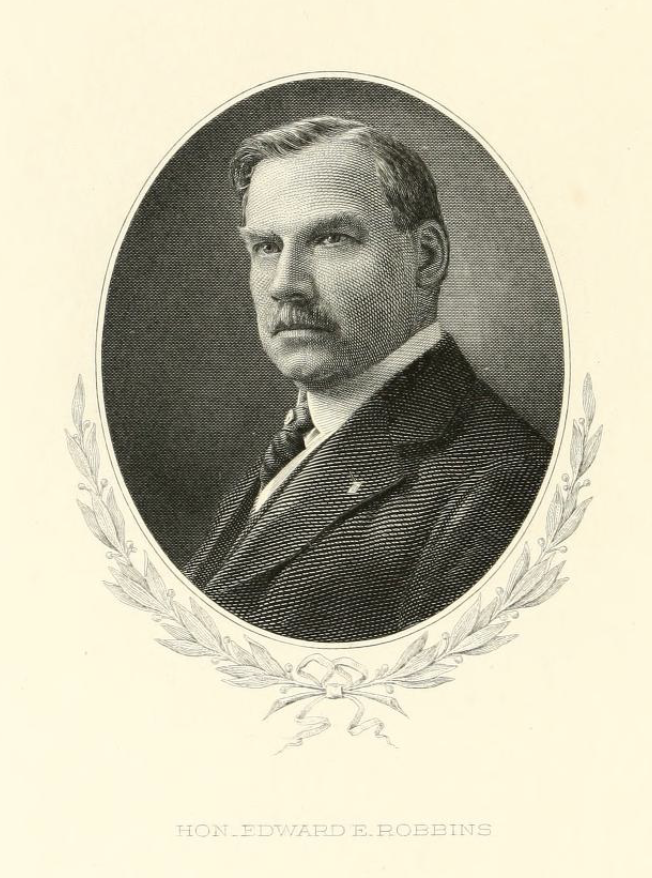
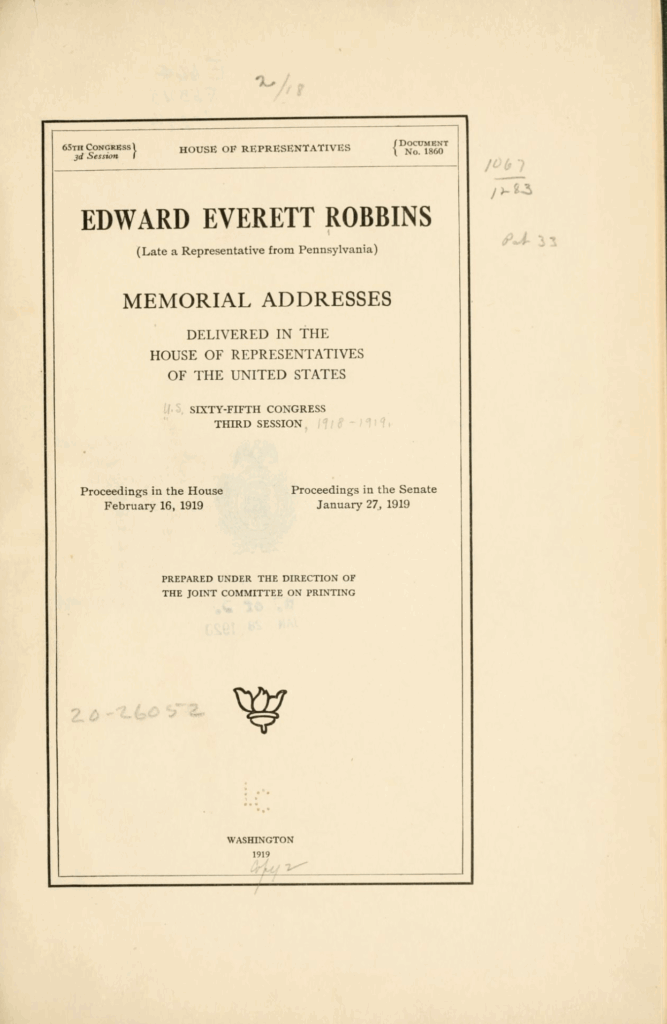
https://archive.org/details/edwardeverettrob02unit/mode/2up